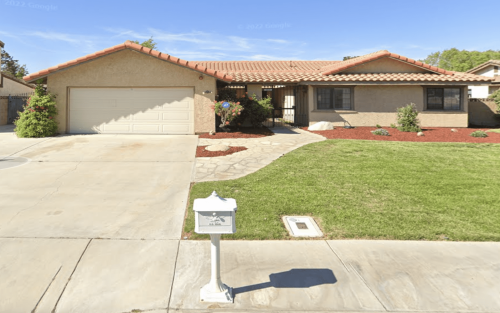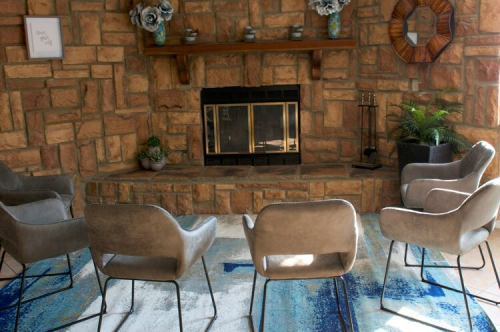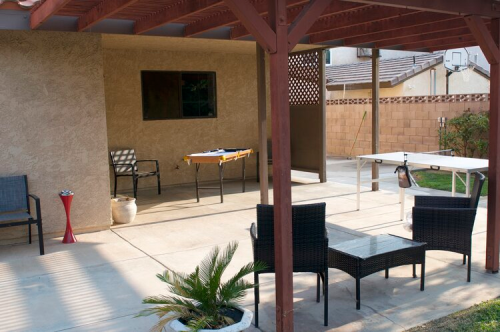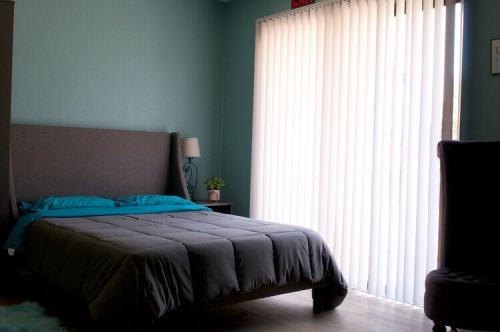






Bellagio in the Desert
Treatment Focus
This center treats substance use disorders and co-occurring mental health conditions. Your treatment plan addresses each condition at once with personalized, compassionate care for comprehensive healing.
Primary Level of Care
Offering intensive care with 24/7 monitoring, residential treatment is typically 30 days and can cover multiple levels of care. Length can range from 14 to 90 days typically.
Claimed
Recovery.com has connected directly with this treatment provider to validate the information in their profile.
Treatment Focus
This center treats substance use disorders and co-occurring mental health conditions. Your treatment plan addresses each condition at once with personalized, compassionate care for comprehensive healing.
Primary Level of Care
Offering intensive care with 24/7 monitoring, residential treatment is typically 30 days and can cover multiple levels of care. Length can range from 14 to 90 days typically.
Provider's Policy
We accept most major insurance.
Bellagio in the Desert
Bellagio in the Desert
About Bellagio in the Desert
Bellagio in the Desert is a charming rehabilitation center located within a residential home. They provide personally tailored treatment and a family-like atmosphere for adults experiencing addiction and co-occurring mental health disorders.
Clinically Supervised Detox Services
Bellagio in the Desert prioritizes helping clients safely and comfortably detox from substances. After a thorough evaluation process, a compassionate team of therapists, clinicians, and nurses develop an individualized recovery plan tailored to each patient’s specific needs. Clients in need of detox services are offered 24/7 support with medication-assisted treatment (MAT) to provide clinical comfort along with psychological and emotional support throughout the detoxification and withdrawal process. Bellagio also offers a more holistic approach with a social detox program. Social detox involves monitoring clients as they go through the physical withdrawal process and using counseling and therapy for emotional support rather than a medical intervention.
Bellagio in the Desert provides detox services and residential treatment for individuals struggling with addictions to alcohol, opioids, methamphetamine, benzodiazepines, cocaine, and marijuana.
Comprehensive Care
After the detox process, clients begin intensive therapeutic work through group and individual evidence-based therapy to address underlying causes of their addiction. Bellagio provides a caring atmosphere and safe space to receive professional therapy and compassionate care. Inpatient care offers clients the opportunity to fully heal, diagnosing and treating any co-occurring mental health conditions, addressing past traumas, and creating a strong community of support.
Their robust treatment programs consist of individual, group, and holistic therapies. Individual therapy offers highly structured and hands-on 1-on-1 sessions with a therapist using evidence-based methods such as cognitive-behavioral therapy (CBT). This short-term, goal-oriented psychotherapy method helps clients acknowledge and change negative thinking patterns and behaviors that negatively impact their lives.
Group therapy sessions offer peer support and compassion as patients bond over shared experiences. Clients may participate in cognitive behavioral groups, psychoeducational groups, interpersonal therapy groups, skill development groups, non-expressive groups (art, dance, and music therapy), and 12-step support groups throughout their treatment.
Personally tailored treatment plans are designed to heal the mind, body, and spirit. In addition to evidence-based modalities, their holistic addiction treatment offers methods such as yoga, exercise, meditation, gardening, pet therapy, spiritual services and faith counseling, nutrition, and art, dance, or music therapy.
Bellagio in the Desert offers 24/7 support from mental and physical healthcare providers, committed to understanding each individual's trauma and challenges surrounding addiction in a healing and distraction-free environment. Short and long-term care is available dependent on individual needs, with the average stay in their program being 90 days.
Bellagio in the Desert is a Joint Commission accredited facility. They accept most major insurance providers.
Center Overview
Treatment Focus
This center treats substance use disorders and co-occurring mental health conditions. Your treatment plan addresses each condition at once with personalized, compassionate care for comprehensive healing.
Joint Commission Accredited
The Joint Commission accreditation is a voluntary, objective process that evaluates and accredits healthcare organizations (like treatment centers) based on performance standards designed to improve quality and safety for patients. To be accredited means the treatment center has been found to meet the Commission's standards for quality and safety in patient care.
Insurance Accepted
Cash Pay Rates
Estimated Cash Pay Rate
Center pricing can vary based on program and length of stay. Contact the center for more information. Recovery.com strives for price transparency so you can make an informed decision.
Levels of Care






Your Care Options
Specializations
Twelve Step
Incorporating spirituality, community, and responsibility, 12-Step philosophies prioritize the guidance of a Higher Power and a continuation of 12-Step practices.
Co-Occurring Disorders
A person with multiple mental health diagnoses, such as addiction and depression, has co-occurring disorders also called dual diagnosis.
Medication-Assisted Treatment
Combined with behavioral therapy, prescribed medications can enhance treatment by relieving withdrawal symptoms and focus patients on their recovery.
Who We Treat
Men and Women
Men and women attend treatment for addiction in a co-ed setting, going to therapy groups together to share experiences, struggles, and successes.
Approaches
Personalized Treatment
The specific needs, histories, and conditions of individual patients receive personalized, highly relevant care throughout their recovery journey.
Twelve Step
Incorporating spirituality, community, and responsibility, 12-Step philosophies prioritize the guidance of a Higher Power and a continuation of 12-Step practices.
Medical
Medical addiction treatment uses approved medications to manage withdrawals and cravings, and to treat contributing mental health conditions.
Holistic
A non-medicinal, wellness-focused approach that aims to align the mind, body, and spirit for deep and lasting healing.
Therapies
Dance Therapy
This experiential therapy uses dance to improve body awareness, physical health, and social skills.
Spiritual Care
Tending to spiritual health helps treatment become more effective, allowing patients to better cope with their emotions and rebuild their spiritual wellbeing.
1-on-1 Counseling
Patient and therapist meet 1-on-1 to work through difficult emotions and behavioral challenges in a personal, private setting.
Psychoeducation
This method combines treatment with education, teaching patients about different paths toward recovery. This empowers them to make more effective decisions.
Art Therapy
Visual art invites patients to examine the emotions within their work, focusing on the process of creativity and its gentle therapeutic power.
Meditation & Mindfulness
A practiced state of mind that brings patients to the present. It allows them to become fully aware of themselves, their feelings, and the present moment.
Conditions We Treat
Anxiety
Anxiety is a common mental health condition that can include excessive worry, panic attacks, physical tension, and increased blood pressure.
Depression
Symptoms of depression may include fatigue, a sense of numbness, and loss of interest in activities. This condition can range from mild to severe.
Trauma
Some traumatic events are so disturbing that they cause long-term mental health problems. Those ongoing issues can also be referred to as "trauma."
Substances We Treat
Cocaine
Cocaine is a stimulant with euphoric effects. Agitation, muscle ticks, psychosis, and heart issues are common symptoms of cocaine abuse.
Benzodiazepines
Benzodiazepines are prescribed to treat anxiety and sleep issues. They are highly habit forming, and their abuse can cause mood changes and poor judgement.
Co-Occurring Disorders
A person with multiple mental health diagnoses, such as addiction and depression, has co-occurring disorders also called dual diagnosis.
Drug Addiction
Drug addiction is the excessive and repetitive use of substances, despite harmful consequences to a person's life, health, and relationships.
Heroin
Heroin is a highly addictive and illegal opioid. It can cause insomnia, collapsed veins, heart issues, and additional mental health issues.
Methamphetamine
Methamphetamine, or meth, increases energy, agitation, and paranoia. Long-term use can result in severe physical and mental health issues.
Opioids
Opioids produce pain-relief and euphoria, which can lead to addiction. This class of drugs includes prescribed medication and the illegal drug heroin.
Alcohol
Using alcohol as a coping mechanism, or drinking excessively throughout the week, signals an alcohol use disorder.
Languages
Care Designed for Your Needs
Personal Amenities
Amenities
Activities
Yoga
Yoga is both a physical and spiritual practice. It includes a flow of movement, breathing techniques, and meditation.





